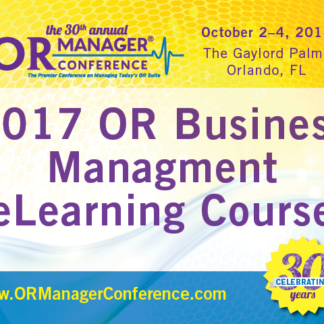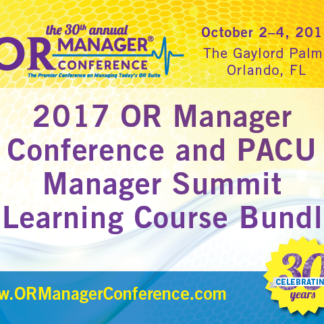Description
This package include the most popular and trending sessions presented at the 2023 OR Manager Conference. It includes 7 sessions and opportunity to earn 7 contact hours upon completion of a posttest.
Sessions include:
ASC: Creative Staffing Models to Increase Surgical Case Volume Within a Fixed Footprint
Perioperative services have faced significant capacity challenges due to physical space constraints, finite equipment resources, and national staffing shortages. This session will focus on strategies to optimize staffing capacity through aggressive onboarding, cross-training and migrating non-complex cases to ambulatory surgery centers.
Learning Objectives
- Evaluate the effectiveness of staffing models in addressing capacity challenges and improving job satisfaction among perioperative staff.
- Understand the impact of case load management strategies, including decanting non-complex cases and transferring non-surgical procedures to local ambulatory surgery centers.
- Measure the effectiveness of aggressive load leveling strategies in increasing OR utilization and recapturing maximum capacity per day.
Business: Profitability in the OR – Benchmark Your OR’s Performance
How do you maintain profitability when costs are increasing, reimbursement is stagnant, and surgery contribution margins are decreasing? Attend this session to understand how to analyze profitability, maximize service lines and report your OR’s performance.
Learning objectives:
- Review processes that drive actionable change in contribution margin.
- Understand key partnerships for process improvement.
- Present data driven results to your OR governance committee and hospital leadership.
Clinical: Pre-habilitation: An Innovative Approach
The traditional model of pre-op clinics and pre-admission testing are designed to coordinate a perioperative plan of care and provide patient education. But for high-risk surgical patients, a better approach to pre-admission is needed to ensure improved patient outcomes.
Hear how one facility developed a “Pre-habilitation” optimization clinic for high-risk patients, engaging them weeks before surgery to improve co-morbid medical conditions. Learn how they decreased the rate of complications and improved patient outcomes through collaboration with various service lines, primary care, senior leadership, nursing and anesthesia.
Learning objectives:
- Discover the benefits of a “Pre-habilitation” clinic for high-risk surgical patients.
- Learn communication tools to collaborate across teams to improve pre-surgical plan of care.
- Evaluate processes to decrease the rate of adverse events and improve patient outcomes.
Leadership: Establishing an Environment of Continuous Improvement
To be competitive in today’s surgical suite, health care systems must establish an environment of continuous improvement for safe patient care and staff satisfaction. To ensure the highest level of quality and safety, it is imperative to develop a framework between hospital leadership and perioperative services.
Hear one case study on how cross-functional teams came together to launch a continuous improvement initiative. Learn how they engaged staff, identified weaknesses in processes, and how they used lean and six sigma tools throughout the process.
Learning objectives:
- Track and report perioperative process improvement initiatives.
- Understand the importance of continuous improvement in healthcare.
- Learn how to replicate the program as desired at other institutions.
Leadership: Activating Tomorrow’s Leaders…Today!
The nurse staffing crisis, competing demands and shrinking hospital margins are putting nurse leaders to the ultimate test. In order to be an effective leader, the stakes are higher than ever. The need to balance optimism in the face of adversity is paramount to confront reality and build a resilient team.
Effective leadership has to look very different to motivate teams today. This presentation will address issues related to racial bias in healthcare, patient care delivery models, sustainability and integrating well-being to effectively lead today.
Learning objectives:
- Learn the key characteristics and traits of effective leadership.
- Verbalize the importance of social corporate responsibility in leading a team.
- Develop leadership tools to navigate today’s challenging environment.
New Leader: Managing Disruptive Behavior – A New Approach to Better Communication
How do you manage disruptive behavior in your OR? The OR Nurse Manager shoulders responsibility to create an inclusive, safe environment for the entire surgical team addressing threats including disruptive behavior. Disruptive behavior directed towards others, often witnessed, and violating the standard of respectful conduct, may be expressed by increasing levels of severity as incivility, micro-aggressions, bullying, or sexual harassment. It’s important to respond in a consistent, timely manner to improve staff morale, and increase productivity and staff retention. Using tools to help guide you along the way, such as the “Safe Surgery Debriefing Protocol” (SSDP) can be your key to success.
Learning objectives:
- Define “Safe Surgery Debriefing Protocol” (SSDP) as a tool to address issues in communication.
- Learn how using demonstration videos and mock debriefings can serve as a tool to mitigating disruptive behavior.
- Build self-confidence for all team members to speak up.
PACU: We Are Doing What…Where? Procedure Care in the PACU
Creatively utilizing the entirety of a nurse’s scope of practice can provide professional opportunities and help to address challenges related to healthcare demand. Hear a case study from one facility facing logistical challenges with staff and how the perioperative leaders came together to cross-train PACU nurses to provide procedural support.
Learning objectives:
- Learn how to increase utilization by cross-training staff for procedural care.
- Explain the clinical standards required for procedural care in the recovery area.
- Understand who the key stakeholders are to help you need in the procedural care process.
To learn more about the sessions, visit: 2023.ORManagerConference.com/conference



